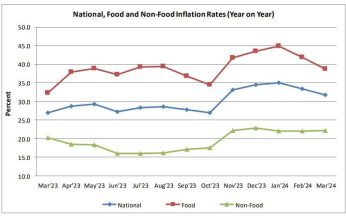Hundreds of Castel-linked jobs at stake
Hundreds of jobs linked to Castel Malawi Limited, producers of alcoholic and non-alcoholic beverages, are at stake after the company threatened to close its business in protest of high excise tax rate.
In a statement issued yesterday, Castel Malawi, which took over from Carlsberg Malawi Brewery, said its efforts to negotiate with Malawi Revenue Authority (MRA) on the matter have failed and the tax collector issued a final notice against the company.

But MRA head of corporate affairs Steven Kapoloma said the public tax collector will not respond on the concerns raised by Castel because the issue borders on taxpayers’ confidentiality.
Castel Malawi said MRA has since frozen the company’s accounts and said the tax collector’s actions mean the company is at risk of closure and the withdrawal of Castel Group from Malawi due to unrealistic and unaffordable excise calculations.
The statement said in 2013, MRA confirmed the calculation of excise tax for alcoholic beverages be based on 90 percent of production cost and in September 2018, MRA advised the company to start calculating excise tax based on ex-factory price production cost plus margin.
The company said at the rate of 90 percent, it will adversely affect the performance, cash-flow and survival of the company as the tax collector has been trying to enforce implementation of the new base.
Further, the company said it tried to negotiate that the excise tax rate be revised downwards to a more realistic and fair rate as per the practice in Common Market for Eastern and Southern Africa (Comesa) and Southern African Development Community (Sadc) countries.
The company said as recently as June 13 2019, Castel Malawi managing director Hervé Milhade and his management team met with top MRA officials, including commissioner-general Tom Malata and commissioner of domestic taxes Nellie Jimu but to no avail.
Reads the statement: “The position the company finds itself in, means the potential end of a beverage legacy for the country. This means a Malawi without brands with such strong national heritage such as Sobo squash, Malawi Gin, Premier Brandy; a Malawi without Carlsberg beers, a Malawi without the Coca-Cola franchise, a Malawi without Castel Beer, a Malawi without professional and grassroot level football sponsorship.
“The vision of Castel Malawi Ltd is to grow and expand, giving consumers more beverage options and a quality beverage experience. The company’s managing director and management team will continue to put in every effort to rectify the current situation in order to sustain operations and their commitment to customers, consumers and general public.”
But Kapoloma said MRA meets and engages a lot of companies and conducts audits, including closing of some businesses for not complying with the taxation laws.
He said: “We can only advise them [Castel] to comply with the law because excise tax is applicable to industries that are chargeable excise tax and not to individual companies. We expect the players in that industry to comply and others are complying in the same industry.”
Tax expert Emmanuel Kaluluma yesterday faulted government, saying within the national budget, government changed the method of calculating the excise tax and the position of government has been that in previous years, the calculation was interpreted but because of the current misinterpretation the excise rate is at 90 percent.
He said investors come to Malawi to make money and if they lose money through the tax system then it becomes hard to sustain business.
Said Kaluluma: “The argument has been that why can’t the government reduce the rate at 90 percent to a lower rate and then change the quantum. In response, they have been saying no, they have been saying the next budget is in June why don’t you wait for the budget so that these issues are taken on board. So, the MRA has been wrongly calculating the tax and instructed the banks to start deductions and that is where the war is coming from.”
Kaluluma described the 90 percent excise tax as consumer tax which means that 90 percent will be paid by the consumers of the products, as the Castel Malawi Limited may impose the same to consumers.
Recently, the company also announced its planned retrenchment of 300 staff owing to the company’s struggling business.
Castel Malawi is rated as one of the top 10 taxpayers in the country, contributing to the development of the economy for over 50 years and are also the number one taxpayers of import duties.
The company employs a workforce of 1 284 people with a business network of over 100 000 stakeholders, customers, suppliers, distributors contractors, locally and internationally.





